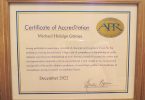Last year I passed an important milestone in my career: I had 10-plus years of experience in communications. I had already set a personal goal to land a director-level position, but this milestone somehow made it feel more attainable. It also got me thinking more critically about the skills I’d need to succeed when I got there.
As an English major with a minor in communications, I learned most of my PR skills on the job. I have a wide range of experience, from internal to corporate to digital communications. Still, I was looking for more technical knowledge in the areas that I had less direct experience in so I could expand my value both to potential employers and to the team I’d lead.
Thanks to the encouragement of my colleagues (especially my manager), I decided to pursue my Accreditation in Public Relations. Not only did it help me validate my on-the-job education, it reminded me how fascinating our field is and how much I love learning about the theories and models behind it.
A few months after I was accepted into the APR program, I landed a new director-level position. I completed my questionnaire from the perspective of one job and did my Panel Presentation on a project from another — all while transitioning into a new role. While it was rather chaotic, I got that confidence I was seeking from my Accreditation and could apply it right away.
Preparing for my Panel Presentation grounded me the most in the RPIE planning process. (RPIE stands for Research, Planning, Implementation and Evaluation.) I spent about a month assembling my presentation binder, writing talking points and rehearsing. The process and the feedback I got from my colleagues along the way, as well as the questions from my panel reviewers, reassured me of my strengths as a strategist and helped me better understand how to articulate my value.
I found the computer-based Examination for Accreditation in Public Relations a bit more challenging, especially as my work started to take up more of my time. I enrolled in the APR Online Study Course and leveraged the materials — especially the practice question exercises — but I mostly prepared alone. I’m a pretty independent learner who remembers things best after physically writing them down, so I focused my time on reading, note-taking and flashcards. My studies reignited that decade-old academic in me, especially because it highlighted an important opportunity for my growth: more experience conducting research (rarely a priority in the corporate world).
Despite some craziness, it was the right time in my career for me to pursue my APR. I also feel that right now, getting back to the basics is more important. The relationships that individuals in our society have with mass media, corporations and governmental agencies are convoluted and intertwined. As PR professionals, we need to be equipped and grounded enough to act as ethical advisers to our clients — it’s our job to help them truly understand how to have mutually beneficial relationships and contribute positively to a society that’s becoming increasingly skeptical and scared.
Thanks to my APR, I have more confidence in my ability to function as a strategic PR professional and take on the additional challenges our field faces today.
For more information about the Accreditation in Public Relations process, visit www.praccreditation.org
Heather Vana, APR, is editorial director at Avnet.








Congratulations – and thank you for sharing your story! Hearing how others make it through the APR journey is a great help to those who are wavering.